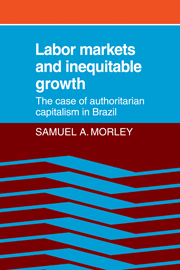Book contents
- Frontmatter
- Contents
- List of tables and figures
- Preface
- Part I Growth, employment creation, and inequality in Brazil
- Part II The effect of supply and demand on labor markets during rapid economic growth
- 6 Migration and the modernization of the agricultural labor force
- 7 The absorption of migrants into the urban economy
- 8 Trends and theories of the wage differential during economic growth
- 9 The market for skilled labor
- 10 Agriculture, wage policy, and the wages of unskilled labor
- 11 Additional perspectives on inequitable growth in Brazil
- 12 Conclusions
- Data appendix
- Bibliography
- Index
8 - Trends and theories of the wage differential during economic growth
Published online by Cambridge University Press: 07 October 2011
- Frontmatter
- Contents
- List of tables and figures
- Preface
- Part I Growth, employment creation, and inequality in Brazil
- Part II The effect of supply and demand on labor markets during rapid economic growth
- 6 Migration and the modernization of the agricultural labor force
- 7 The absorption of migrants into the urban economy
- 8 Trends and theories of the wage differential during economic growth
- 9 The market for skilled labor
- 10 Agriculture, wage policy, and the wages of unskilled labor
- 11 Additional perspectives on inequitable growth in Brazil
- 12 Conclusions
- Data appendix
- Bibliography
- Index
Summary
In the next three chapters we return to the central issue of this book: the relationship between growth and the distribution of income. A key determinant of earnings inequality in a growing economy is the changing structure of wages. In Brazil there is little doubt that a rise in the wage differential paid to educated labor played an important role in rising inequality over the 1960s. In Chapter 3 we estimated that about 35% of the rise in the Gini coefficient between 1960 and 1970 was due to widening educational differentials. Using a different methodology, Morley and Williamson (1975) derived a much higher estimate for the effect of rising skill differentials.
In a dual economy with surplus labor in the agricultural sector, the supply of unskilled labor exceeds demand, and the wage settles at a subsistence level. If some sort of growth process begins, it is natural to expect that the skill differential would increase. The unskilled wage is anchored by the existence of the surplus, but workers lucky enough to be educated or to find high-productivity jobs in the expanding modern sector will receive a higher wage. The growth process in a dual economy is like an escalator, taking a few out of the crowd at the bottom up to a higher level of income and productivity. For as long as the queue remains at the bottom, a gap opens up between those lucky enough to get a place on the escalator and those still waiting for a ride.
- Type
- Chapter
- Information
- Labor Markets and Inequitable GrowthThe Case of Authoritarian Capitalism in Brazil, pp. 181 - 199Publisher: Cambridge University PressPrint publication year: 1983



